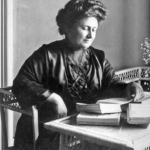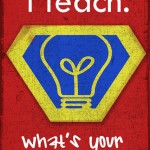Somehow, someway, this semester my students will study the words of W.E.B. Du Bois, Ray Bradbury, William Shakespeare, Octavia Butler, John Updike, and depending on time, a smattering of other poets. But first, we’re studying The Carebears. 9th grade honors indeed!
Scaffolding is nothing new to experienced educators. Take logical steps to reach the end goal. Provide logical supports along the way. Guide students slowly to a goal.
Before The Carebears, let me explain that I view my classroom as my stand-up stage. I’m so good, I could charge a 2-Monster-Energy-Drink minimum; I should leave a bowl of dollar bills for tips on my metaphorical piano. My introduction to Sophocles is the funniest work you will see on this side of Vaudeville. I never worry about engaging students throughout even the most boring topics.
But what happens, when a global pandemic cuts off my mic, closes the comedy club, and confines me to a 3 inch rectangle in the corner of students’ laptops? Worse, the students do not know me at all… How do I engage them now?
Last year, I wrote a blog for this site wondering if I was having fun. Since the beginning of online learning, I can tell you: I have had no other choice. The exponential growth of stress and responsibility of trying to teach remotely pushes me toward necessary levity. Neither my students nor I could possibly handle this level of rigor and stress if the content we are learning is dis-interesting.
In the past, I might have used a shorter short story to scaffold to the longer one. The short stories scaffold to the novel, and I may have used a poem or two to scaffold up toward Shakespeare. This approach is fine. I liked it, I still like it. But… I needed to have fun with these online classes, and so do the kids.
Let me tell you about the fun I have found in the virtual classroom. We started by learning the structure of a paragraph with me explaining to the children that Serena Williams is more dominant than any soccer or basketball star they can think of. A chorus of objections littered the lesson, but it seemed everyone was still engaged by end of the notes.
I wanted students to write about a Jules Verne novel, so I taught them by pulling quotes from Wicked. Elphaba and Glinda’s bickering infused my writing models with a bit of silliness and sass. I loved each class period, and I loved the interjections from my Broadway fans in my virtual audience. Giggles and exasperation flooded our virtual space: “Is he really quoting ‘Defying Gravity’ right now?”
For literature lessons, in the midst of our Sci-Fi Unit, the students took in an episode of the ‘80s cartoon The Carebears where they are emulating Star Trek; The Carebears are interstellar pilots searching for “care crystals” – a vital fuel source. Further Sci-Fi characterization is found in an old episode of an X-men cartoon. We plot the motivation of famed villain Magneto as he, a seemingly 6 foot tall omnipotent force, loses a shoving match with a 14-year-old girl whose power is to fall through things.
I had the kids watch an episode of Are You Afraid of the Dark, and they asked me to listen to The Bill Simmons Podcast. I cut up scenes of Clueless that match up perfectly with chapters of Jane Austen’s Emma.
The real bonus to it all: my students “pick things up” quicker. I mean, I still think I’m just a few gigs away from getting The Mark Twain Prize for American Comedy at the Kennedy Center; however, perhaps these relatable models are more effective than my own charms.
The “less-boring” scaffold approach is getting my kids to a successful level quicker this year than I ever recall students achieving in the past. This virtual school has pushed me to explore more options and expanded my creativity. I think, just as Glinda and Elphaba would tell you: “I have been changed for the better” as an educator.
What surprising success have you found in online teaching? How have you infused personality and fun into lesson planning? Share in the comments below, and maybe drop a link to a resource as well?










Comments 2
Love using Wicked. I write my grammar sentences about whatever TV show I’m watching at the time, so lots of Dr. Who sentences this week. I don’t think they’ve noticed my themes yet.
I’d recommend a book to your audience – City of Thieves by David Benioff. Here’s what Audible says, “During the Nazis’ brutal siege of Leningrad, Lev Beniov is arrested for looting and thrown into the same cell as a handsome deserter named Kolya. Instead of being executed, Lev and Kolya are given a shot at saving their own lives by complying with an outrageous directive: secure a dozen eggs for a powerful Soviet colonel to use in his daughter’s wedding cake. In a city cut off from all supplies and suffering unbelievable deprivation, Lev and Kolya embark on a hunt through the dire lawlessness of Leningrad and behind enemy lines to find the impossible.
By turns insightful and funny, thrilling and terrifying, the New York Times best seller City of Thieves is a gripping, cinematic World War II adventure and an intimate coming-of-age story with an utterly contemporary feel for how boys become men.”